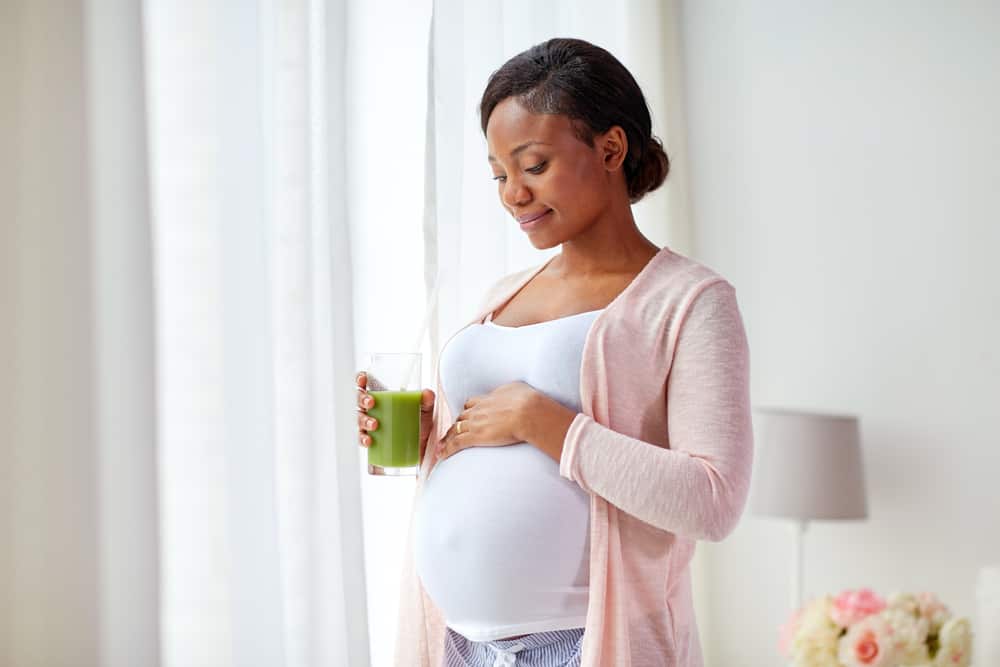Staying hydrated is important for your health, and studies show that most people probably aren’t getting enough to drink throughout the day. When you’re pregnant, hydration becomes even more important—since you’re drinking for two after all.
In early pregnancy, it can become especially hard to stay hydrated if you’re suffering from morning sickness. And not having enough fluids can increase those feelings of nausea, dizziness, and fatigue. We’re sure you’ve read plenty of articles about all the things you can’t eat or drink during pregnancy, but there are also plenty of healthful things from water to juice and beyond that you can drink to help you stay hydrated.
Water
The best thing to drink is good, old-fashioned water. You should drink at least two liters of water every day (bare minimum), before adding in other drinks. If it’s hot out or you find yourself sweating, you should make sure you’re getting even more. And once your baby is born, if you decide to breastfeed, you’ll need to keep sipping even more.
If you’re feeling a little bored and want to mix things up, infused water can be a delicious option to add to your routine. Adding mint leaves, cucumber slices, or lemon to your water can be especially refreshing and help you quench your thirst with extra flavor.
Sparkling water can also help satisfy your soda craving without all the sugar and artificial ingredients. There’s a wide range of sparkling waters on the market that use plant extracts to give them natural flavor without sugar. You can make your own fizzy drink by adding a splash of juice to seltzer water as well.
Herbal Tea

There’s nothing more soothing on a chilly day than a nice hot cup of tea or coffee. Even though you need to reduce your caffeine intake during pregnancy, you still have options in the hot beverage arena.
There is a wide variety of herbal teas that could actually help give you extra nutrients during your pregnancy and might help ease some of your pregnancy symptoms like nausea and sleeplessness. Commercially blended pregnancy teas must prove that they contain no potentially harmful plants, but independent blenders aren’t under such rigorous scrutiny. So, during your pregnancy, stick to established brands and ask your doctor or midwife what they recommend.
Herbal teas come in hundreds of varieties. Here are just a few.
Ginger
Ginger can help with nausea and other digestive upsets. It is widely considered safe to use in small amounts during your pregnancy. It can also help relieve cold symptoms while boosting your immunity, and it gives a lovely warming sensation to your body when you drink it.
Raspberry Leaf Tea
Raspberry leaf has been used for centuries as a health tonic for expecting mothers and modern medical science has found that after the first trimester, it is generally safe to use. This plant is rich in iron and can help tone the uterus, potentially reducing the risk for labor complications.
Chamomile
Chamomile tea is rich in the nutrients calcium and magnesium. It can also help you relax and get better sleep. It reduces inflammation in your body and can even help regulate your blood sugar.
Rooibos
Rooibos is a popular tea from southern Africa that is rich in antioxidants, caffeine-free and has a naturally sweet flavor. It can benefit your cardiovascular health and help you maintain a healthy weight.
Peppermint
Peppermint is another refreshing option that can reduce nausea and digestive problems during pregnancy. It’s also a drug-free way to relieve sinus congestion and potentially help with headaches and migraines as well.
Juice

If you enjoy having a glass of orange juice with your breakfast, that’s not a bad thing. In fact, many orange juices, that popular breakfast option, are fortified with calcium, which is something you need more of during pregnancy to keep your body healthy.
If you want to drink juice, always make sure that it is actually 100% fruit juice, not a “juice cocktail” which can be full of high fructose corn syrup and artificial colors. Also, make sure that the juice is pasteurized. Freshly squeezed juices, while delicious, carry the risk of bacteria that could be harmful to your baby. So skip that at brunch.
Some women worry that consuming sugar during pregnancy is harmful to their baby, so they might avoid fruit juice altogether. If you have a condition like gestational diabetes, then you will have to closely monitor your sugar intake.
If your health is generally good though, you don’t have to completely cut out all sugar. In moderation, sugar can give you an energy boost, and drinking fruit juice is a way to boost your vitamin and mineral intake. Just monitor how much you’re consuming and make sure most of your liquids are water.
Here are some of the other best juices to drink while you’re pregnant.
Prune
Prune juice is full of iron, which can help stave off anemia. It is also loaded with fiber, making it helpful for avoiding the common pregnancy condition of constipation.
Grapefruit
Lower in sugar and calories than many juices, grapefruit juice is still full of antioxidants and vitamins.
Apple
Apples are very nutritious and can help regulate your weight, help boost your immune system, and nourish your baby’s brain development.
Pomegranate
This fruit has gained the reputation of being a superfruit for its high levels of antioxidants. It’s also full of vitamins C and K, iron, and fiber.
Lemon
While drinking straight lemon juice isn’t necessarily something you’ll want to do, adding lemon to your water or having a lightly sweetened lemonade can be a great way to work it into your day. Lemon helps regulate your digestion, manage high blood pressure, and gives you a healthy dose of vitamin C.
Are Pineapple and Grape Juice Safe?
Some concerns have been raised about pineapple being consumed during pregnancy due to the existence of the enzyme bromelain. However, the amount of the enzyme present in pineapple flesh is very minimal, and it is widely considered to be safe to have in juice or in as a snack.
Grapes have also gotten a bad reputation that isn’t entirely deserved. People worry that the compound resveratrol could be harmful to your digestive system during pregnancy. However, the evidence is thin, and grapes contain magnesium and iron, which are important during pregnancy.
Grape juice is high in sugar, though and you lose most of the benefits of their fiber content in juice form. Sticking to whole grapes as a snack is better than sipping grape juice.
Smoothies
We all try to get our five a day and keeping a variety of fruit and vegetable nutrition in our diets becomes more vital when you’re growing a little human inside you. Living a busy life, it can be hard to always eat perfectly balanced meals. Starting your day with a homemade smoothie is a great way to pack in a ton of nutrients.
If you’ve also been having trouble keeping your appetite up in early pregnancy, sipping a smoothie may be easier than sitting down to eat a meal. Especially if you find that your tastes have changed and veggies are unappetizing to you now. Sneaking a few greens and some carrots into your fruit smoothies is a great way to make staying healthy easier.
Smoothies can have a huge amount of variety, so you’ll never get bored. Keep some frozen berries and bananas on hand to add a satisfying natural sweetness along with vitamins and antioxidants.
Having smoothies that are fruit-only isn’t likely to keep you full for too long, as it will mainly be sugar. You can add plain Greek yogurt or a scoop of nut butter to add extra protein and healthy fats to your smoothie. This will help you feel more satisfied and give you the energy to get through your day.
Sports Drinks or Coconut Water
If you suffer from an electrolyte imbalance, or simply find yourself sweating a lot due to your lifestyle or climate, supplementing your water intake with a sports drink might be a good idea. Coconut water is also a popular choice for athletes as it has very similar properties to sports drinks, but is more natural.
Both of these beverages can help replace lost electrolytes in the heat and keep you hydrated, sometimes even better than just plain water. If you’re experiencing muscle cramps during pregnancy, this could be a sign that you need to replenish your minerals, which these drinks can help you do.
However, Sports drinks are often loaded with sugars and artificial ingredients, and even coconut water drinks can have added sugar. Be sure to read the ingredient label and still use water as your main source of hydration throughout the day, only supplementing with these other drinks. Be sure to avoid sports drinks that are actually energy drinks with added caffeine and unregulated supplements. These can be harmful and won’t hydrate you that well anyway.
Milk
Since your body needs extra nutrients during pregnancy, turning to milk might be a great way to ensure you’re getting what you need. Milk is naturally rich in fats, protein, and calcium. Sticking to whole or 2% milk gives you the most of these nutrients.
Most milks are also often enriched with vitamin D, which is vital to your health. It helps you absorb minerals like calcium better, and in the winter, when you’re not getting as much sunlight, many people suffer from vitamin D deficiencies.
The only caveat here is to avoid raw milk. While you might indulge in it from the farm down the road when you’re not pregnant, just like fresh-squeezed juice, unpasteurized milk carries the risk for bacteria that could be harmful to your baby.
Kefir
Probiotics have become a popular health supplement to help regulate your digestion. One of the best ways to gain the benefits of these healthy bacteria is to consume fermented food and drink. While kombucha has become the darling of health food stores, it is often unpasteurized and can have bacteria that can be harmful to a developing fetus.
Kefir is a safer way to get those same benefits. Milk kefir is pasteurized before it is fermented to control the bacteria. It also provides calcium, protein, and fats that your body needs while growing a baby. It’s often made with goat’s milk, but can be produced with cow’s milk as well.
Water kefir is a dairy-free alternative that uses the same lightly fermented grains as the base and dispenses with the milk. It’s often flavored with juice or fruit pulp. Low in sugar and only containing trace amounts of alcohol, both water and milk kefir are generally considered safe for most pregnant women. However, you should consult with your doctor if you have any pre-existing conditions or concerns.
Bone Broth
If you’re looking to enjoy something hot and nourishing, particularly if you’re having trouble keeping down solid food, bone broth is an excellent choice. You can make it at home in a stockpot or pressure cooker (to speed up the process) or you can purchase good quality bone broth at nearly any supermarket.
Bone broth is loaded with nutrients, such as the minerals necessary to build strong bones in your baby and help protect yours too. It’s easier to absorb these minerals through bone broth than supplements and it’s a dairy-free way to get your calcium if you are lactose intolerant. Rich in collagen and gelatin, it will also help keep your skin and nails in great condition. It also helps your body replenish connective tissue , and will help your baby’s bones and joints develop.
This broth is loaded with amino acids that are excellent for supporting the immune system, keeping you healthy. Sipping bone broth is also an easy way to up your protein intake, which is essential for pregnancy and breastfeeding as well.
What Can’t I Drink While Pregnant?

While you must be careful when it comes to your nutrition, you don’t have to completely cut out everything you enjoy. Alcohol should be completely avoided, of course (though there has been some minor debate about that in recent years), but if you want to have the occasional soft drink or even a cup of coffee it is okay in most cases.
Always follow your doctor’s advice, but for most healthy mamas, a little caffeine or sugar won’t be harmful. Keep your caffeine intake to less than 200mg a day. It’s also recommended to have less than 30 grams of added or “free” sugar per day during pregnancy, and as long as the rest of your diet is healthy, you shouldn’t have a problem staying balanced.
Final Thoughts
Pregnancy can be a time of great excitement, but sometimes also great anxiety. It’s easy to hear a lot of conflicting information from various sources about what you should and shouldn’t do. Listening to your doctor and listening to your own body is most important. Fortunately, there are plenty of healthy and delicious beverages you can enjoy while you are pregnant and many of them can even be beneficial for you.
Be careful, but don’t stress yourself out too much. Stress is one of the worst things for you and your little one. If you feel uncertain, don’t go on a Google spiral, ask your doctor and pay attention to how your body feels. If you feel unwell after drinking certain things, avoid them. And if you feel well and full of energy when you eat or drink certain things, then keep them in your regular rotation.
